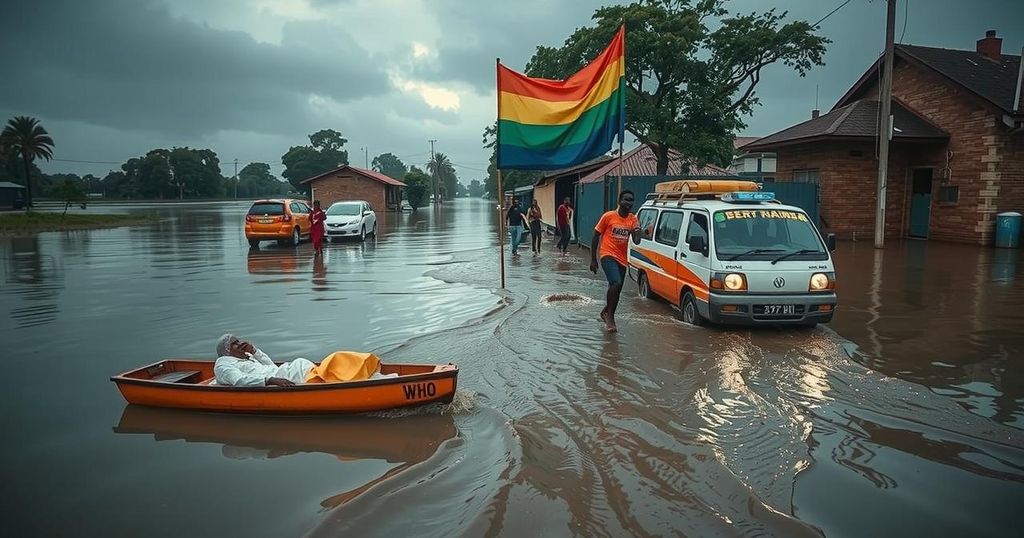South Sudan is facing unprecedented flooding, displacing over 226,000 people and impacting essential health services across multiple counties. The WHO has commenced a large-scale emergency response, distributing health supplies to address urgent health needs, including a rise in malaria and suspected cholera cases.
South Sudan is currently experiencing catastrophic flooding, marking one of the most severe inundations in decades. This environmental disaster has displaced over 226,000 individuals, significantly impacting homes, livelihoods, and key infrastructure, with numerous roads submerged and entire communities severely affected. As of October 4, 2024, floods have impacted 890,000 people across 42 out of the country’s 78 counties, with 58 health facilities submerged and an additional 90 facilities rendered inaccessible. Critical connections, including 15 major roadways linking to the capital, Juba, are currently cut off, complicating access to essential health services. The flooding is exacerbated by substantial rainfall during the rainy season from April to November, which has intensified due to climate change. This has left communities struggling with newfound challenges, including the permanent displacement of populations. In addition, South Sudan is hosting approximately 800,000 refugees and returnees from the ongoing conflict in Sudan, contributing to the already perilous humanitarian situation. In Renk County, cholera cases have been suspected, and there has been a notable increase in malaria cases, with over 120,000 cases and 31 suspected fatalities reported by the end of September 2024. In the past five weeks alone, 55 incidents of snake bites have been documented. In response to this crisis, the World Health Organization (WHO) has mobilized resources to assist afflicted communities. As stated by Dr. Humphrey Karamagi, WHO Representative in South Sudan, “People are in a heightened state of vulnerability due to multiple shocks. WHO is committed to work with the Ministry of Health and our partners to ensure that they have access to essential health services continue while also prioritizing the response to growing humanitarian and health needs.” The WHO has dispatched approximately 88 metric tonnes of emergency health kits to critical areas, containing vital supplies to treat over 870,000 individuals. These supplies include cholera investigation and treatment kits, antimalarial drugs, and snakebite antivenoms. Furthermore, WHO has distributed nearly 1,300 malaria kits across the nation and prepared cholera testing kits to enhance diagnostic capabilities.
South Sudan has faced recurring humanitarian challenges exacerbated by natural disasters and armed conflicts. The current flooding has overwhelmed the country’s fragile health infrastructure and further strained resources that are already insufficient due to the influx of refugees. The WHO’s role in addressing public health emergencies highlights the importance of effective responses to environmental disasters and their implications on health systems. Current measures undertaken by WHO emphasize the imperative of established health services amidst increasing climate threats.
In summary, the severe flooding in South Sudan presents a multifaceted crisis, exacerbating existing health challenges while displacing thousands. The WHO’s proactive intervention through emergency health supplies and commitment to enhancing resilience against future climate impacts underscores the need for robust health systems capable of withstanding such calamities. Continued cooperation with local authorities and healthcare partners remains crucial to mitigate health risks and ensure community needs are met effectively.
Original Source: www.afro.who.int







